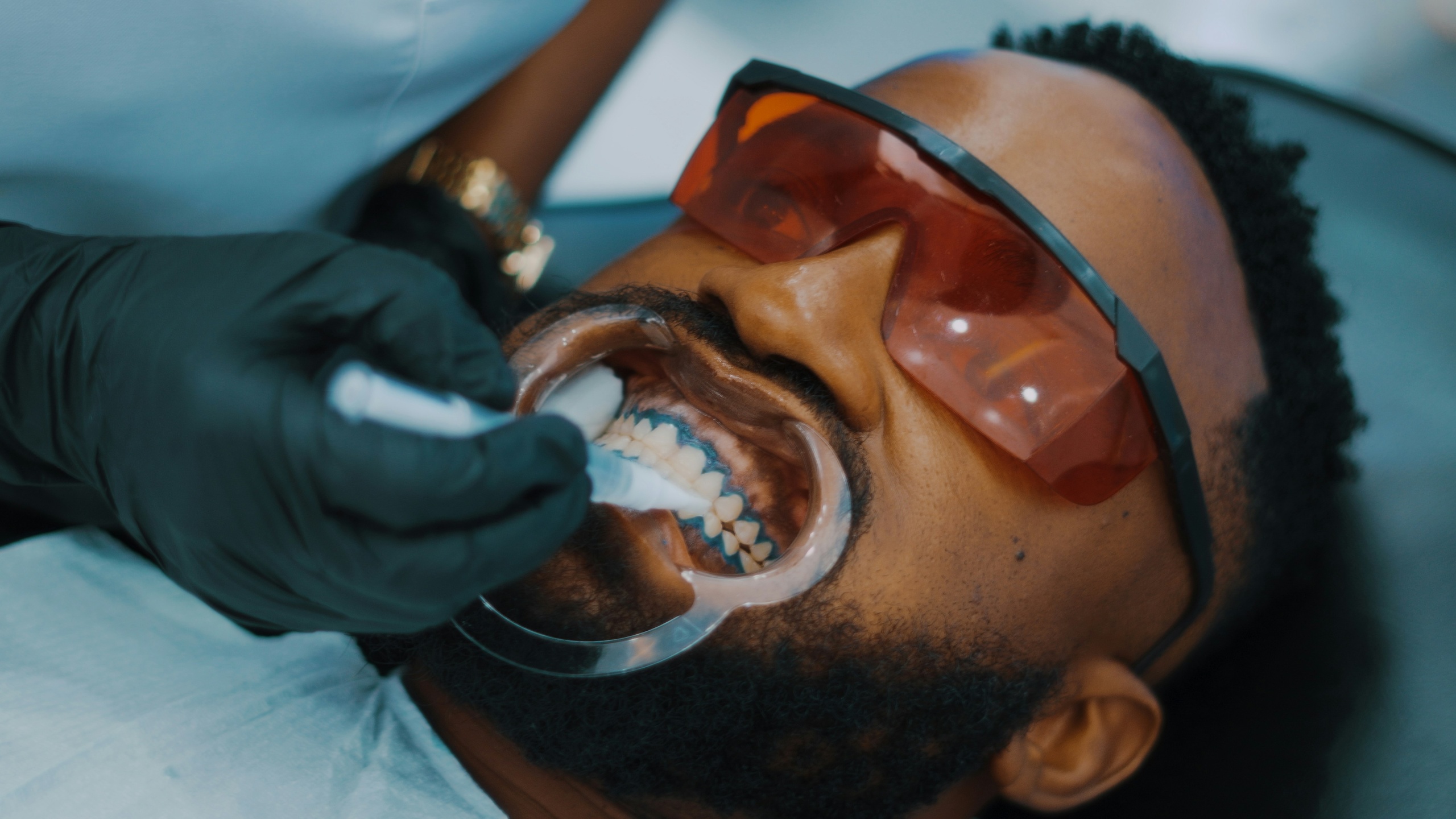If you’ve been thinking about teeth whitening in NJ, you’re not alone. Everyone wants a brighter smile, and it’s one of the most popular cosmetic requests at NJ dental offices. That’s for good reason: professional teeth whitening in NJ is safe and effective. You’ll get noticeable results for that special event, or just to refresh your appearance.
Let’s break down everything you can expect at your first in-office whitening appointment. Read on to discover how it works, who it’s for, and what happens before, during, and after the procedure.
Key Takeaways
- Professional teeth whitening uses concentrated peroxide gels stronger than over-the-counter products
- The in-office whitening procedure takes approximately 45–60 minutes and can lighten teeth several shades in a single visit
- Ideal candidates have healthy teeth with staining from food, drinks, smoking, or natural aging
- Results can last 6 months to 2 years depending on your habits and maintenance routine
- Some temporary sensitivity is normal but usually resolves within 24–48 hours after treatment
What Is Professional Teeth Whitening and How Does It Work?
Professional teeth whitening is a treatment that uses hydrogen peroxide or carbamide peroxide to oxidize and break down stains on the enamel and dentin. This makes teeth appear several shades lighter in one or more sessions.
The bleaching agents used by NJ dentists are much stronger than over-the-counter products. In-office treatments usually use hydrogen peroxide concentrations between 25% and 40%. Sometimes they’re combined with a light or heat source to speed up the process.
These chemicals react with stain-causing molecules, breaking them apart so they’re less visible. The result is a whiter smile that reflects light better and looks more vibrant after just one visit.
Who Is a Good Candidate for Teeth Whitening in NJ?
Teeth whitening works best for adults with healthy teeth, no untreated cavities, and staining from food, drinks, smoking, or natural aging.
If your teeth are discolored from drinking coffee, tea, red wine, or smoking tobacco, you’re likely to see strong results. Whitening can also improve yellowing from age, as enamel thins and dentin shows through.
But, not everyone is a good candidate:
- People with gum disease, tooth decay, or extreme sensitivity should not undergo bleaching without treating those issues first.
- Whitening does not affect crowns, veneers, or fillings.
- Stains from medications like tetracycline or conditions like fluorosis may be more difficult to treat.
Your NJ dentist will check your oral health and determine whether professional teeth whitening in NJ is right for you.
How Should You Prepare for Your Whitening Appointment?
Before your first whitening session, schedule a professional cleaning. Removing plaque and tartar helps the whitening gel penetrate your enamel.
If you’ve experienced tooth sensitivity in the past, your dentist may recommend using a toothpaste for sensitive teeth before the treatment. They may also apply a desensitizing agent, like potassium nitrate, before whitening to reduce discomfort.
Avoid highly pigmented foods (like berries or curry) and drinks (such as red wine and cola) for at least 24 hours before your appointment. This keeps your enamel as clean and stain-free as possible going in.
What Happens During an In-Office Whitening Appointment?
An in-office laser teeth whitening treatment in NJ usually takes between 45 and 60 minutes and includes the following steps:
- Initial Examination
The dentist will examine your teeth and gums, make sure you’re a good candidate, and select a baseline shade. - Isolation
Your lips and gums are protected with a retractor and barrier gel to prevent irritation. - Application
A peroxide-based gel is applied directly to your teeth. - Activation (Optional)
Some systems use a curing light or laser to enhance the gel’s effectiveness. - Reapplication
The gel is left in place for 15–20 minutes and may be reapplied for a second or third round depending on your needs. - Final Rinse and Comparison
After the gel is removed, your teeth are rinsed and compared against the original shade to check for improvement.
You’ll leave the office with visibly whiter teeth, often several shades lighter than when you arrived.
Before and After Whitening: Timeline
- 24 hours before: Avoid staining foods and drinks
- 1 hour before: Arrive with clean teeth
- During (45–60 minutes): The whitening procedure
- Immediately after: Initial results visible
- 24–48 hours after: Avoid staining substances
- 1 week after: Final results stabilized
- 6 months after: Consider touch-up treatment
Will the Procedure Cause Tooth Sensitivity or Discomfort?
Some patients experience mild, temporary sensitivity or gum irritation after whitening. This usually resolves within 24–48 hours.
In-office whitening may trigger short-term tooth sensitivity, especially during or immediately after the procedure. However, most patients tolerate it well with precautions like desensitizing gels and careful application.
To reduce post-procedure sensitivity:
- Avoid hot or cold drinks for 24 hours
- Brush with toothpaste designed for sensitive teeth
- Use a fluoride rinse if recommended by your dentist
Most side effects are minimal and temporary. But if you experience significant discomfort, your dentist can suggest a personalized solution.
How Long Do Whitening Results Last After the First Treatment?
Professional teeth whitening can last anywhere from 6 months to 2 years depending on your habits and whether you use touch-up treatments.
To maintain your results:
- Avoid smoking and reduce consumption of staining foods
- Maintain a consistent brushing and flossing routine
- Use custom take-home trays for occasional maintenance, if provided by your NJ dentist
If your whitening is part of a larger cosmetic plan, your dentist may schedule extra sessions or suggest over-the-counter options.
What Should You Do After the Whitening Appointment?
After your appointment, your teeth will be slightly more porous, making them vulnerable to re-staining. For the first 24–48 hours, avoid:
- Coffee, tea, red wine, or dark sodas
- Foods like tomato sauce, soy sauce, or berries
- Smoking or vaping
Stick to light-colored foods (chicken, rice, apples, cauliflower) and drink a lot of water. Your dentist may also provide a touch-up kit or schedule a follow-up visit.
Continue brushing with a non-abrasive toothpaste and avoid whitening toothpaste for a few days.
What Are the Risks of Teeth Whitening?
Teeth whitening is generally safe when performed by a licensed dentist, but it carries some short-term risks.
These may include:
- Gum irritation from contact with peroxide
- Increased tooth sensitivity
- Uneven whitening if you have fillings or restorations
- Temporary pulp inflammation (rare)
- Possible allergic reactions
Professional teeth whitening in New Jersey is not recommended for:
- Pregnant or nursing women
- Children under 16 years of age
- People with receding gums or exposed roots
- Those with untreated cavities or gum disease
- Individuals with known chemical sensitivities
Overusing at-home or over-the-counter products without guidance can damage your enamel and irritate your teeth. That’s why it’s best to consult a professional, especially during your first experience with teeth whitening in NJ.
Teeth Whitening in NJ FAQs
How long does in-office teeth whitening take in NJ?
The appointment usually lasts 45–60 minutes, including setup and multiple gel applications.
Is teeth whitening covered by dental insurance?
No. It’s considered a cosmetic procedure and is not covered by most insurance plans.
Will whitening work on crowns or fillings?
No. Only natural enamel can be whitened. Crowns, veneers, and fillings keep their original color.
Can teens get teeth whitening treatments?
Most dentists recommend waiting until age 18 due to enamel sensitivity and developmental concerns.
How often can I whiten my teeth?
Most professionals recommend no more than once every 6 months for in-office treatments, with at-home maintenance between.
Choosing the Right Teeth Whitening Option in NJ
If you’re in New Jersey and interested in whitening your teeth, your best results will come from a licensed dental provider. Cosmetic dentists throughout NJ offer a range of options, from same-day in-office whitening to supervised at-home treatments with custom trays.
Skip the salons and unregulated kiosks. Professional care ensures your safety and the best possible outcome. An experienced NJ dentist can guide you to the right treatment for your goals, oral health, and budget.
Maintaining Whiter Teeth for Good
Professional teeth whitening offers a fast and noticeable way to brighten your smile, and your first appointment is a straightforward and comfortable experience. From evaluation to aftercare, your NJ dentist will guide you every step of the way.
If you’re ready to boost your confidence and see real results, schedule a teeth whitening consultation with a local NJ dental office today. A brighter smile could be just one appointment away.
Resources:
https://www.hopkinsmedicine.org/health/treatment-tests-and-therapies/teeth-whitening
https://www.ada.org/resources/ada-library/oral-health-topics/whitening




